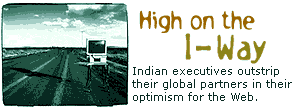


|
|

|
|
| HOME | INFOTECH | HEADLINES | |||
| June 10, 1998 |

The 'BT World Communications Report 1998-99' was conducted with the objective of finding out the views of senior officials of multinational companies in 20 countries. The survey has three sections - attitudes towards telecommunications competition, attitudes towards telecommunications technology and impact of technology on society. Companies surveyed are from different sectors of the economy, but exclude telecom suppliers and manufacturers. One interview each was conducted with senior executives of 1,031 companies worldwide and 53 companies in India. It emerged that 90 per cent of the executives interviewed believed that they had a right to an open and competitive technology and 78 per cent of them supported the WTO telecom agreement. Seventy-nine per cent of the Indian executives supported the WTO agreement. Eighty-one per cent of them believe that with telecom competition, investment flow into the country would increase. Eighty-seven per cent of the Indian officials felt that their own companies would benefit from competition. When asked about barriers to competition, respondents in the Asia Pacific region cited the main reason as dominance of monopoly (45 per cent). This was followed by over-regulation (28 per cent); poor telecom infrastructure (30 per cent); link between monopolists and government (25 per cent); lack of government support (25per cent); lack of local policy (24 per cent); insufficient enforcement of regulation (21 per cent) and lack of independent regulator (18 per cent). Watching technology and what it can do seems to be more critical to businesses today than even customer surveys. When asked about main drivers of change today, 90 per cent responded that their business was driven by change in technology as against 88 for increase in competition, 88 for globalisation of business and 84 for more demanding customers. Ninety-two per cent of the Indian executives believe that technology is one of the main drivers of change. And further 94 per cent of the Indian executives responded that they believed that information would be the main strategic weapon in the next decade. British Telecom managing director for India Arun Seth, says: "I expected that Indians would understand that this is an opportunity for us to leap frog. What comes as a surprise is the overwhelming number. It is also a pity that we have only 89,000 or so Internet connections when the corporate houses at large feel that it is a great opportunity." For instance, he cites, 74 per cent of the Indian executives as against 64 per cent worldwide, feel that small organisations can compete effectively using Internet technology. The BT report, analysing the survey findings, also contains interesting references from other surveys. One such corporate survey conducted by Andersen Consulting and the economic intelligence units reveals that 40 per cent of all executives believed that their organisations would be virtual by 2010. Only 3 per cent regarded their corporates virtual today. - Compiled from the Indian media |
||
|
HOME |
NEWS |
BUSINESS |
CRICKET |
MOVIES |
CHAT
INFOTECH | TRAVEL | LIFE/STYLE | FREEDOM | FEEDBACK |
|||